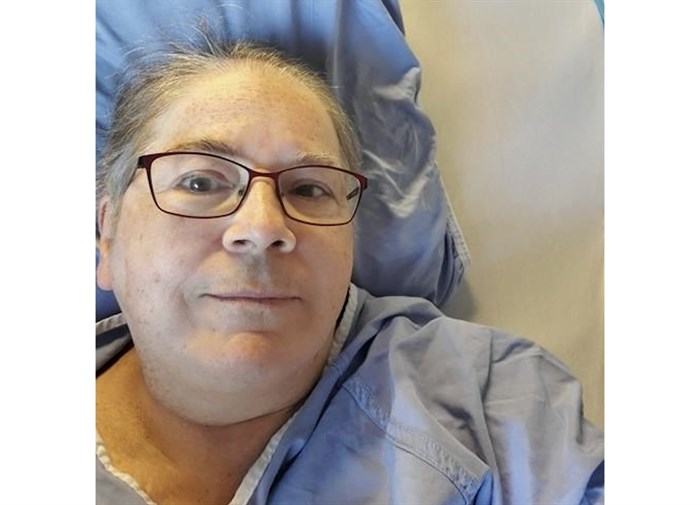
British Columbia leads the country with the highest number of deceased organ donations per population, and Heather Martin was "happy, happy, happy" to receive a kidney last October, 17 years after being diagnosed with kidney disease. Martin is seen in an undated handout photo.
Image Credit: THE CANADIAN PRESS/HO-Heather Martin
January 29, 2024 - 9:00 PM
VANCOUVER - Heather Martin was having trouble walking even short distances as she waited for a kidney transplant. But on Oct. 12, 2023, a phone call at work made her "happy, happy, happy."
"I said, 'I got a call for a kidney, bye!'" recalled Martin, who had surgery the next day.
She'd been on dialysis for two years, when she was automatically placed on a transplant wait list. That was 17 years after she was diagnosed with kidney disease, Martin said from Cultus Lake, in British Columbia's Fraser Valley.
On Monday, the province announced that it saw a record-breaking 563 organ transplants last year from a record160 deceased organ donors and 77 living donors.
Edward Ferre, provincial operations director for BC Transplant, said B.C. had 28.8 deceased donors per million population in 2023, the highest in the country.
He said that in line with similar practices elsewhere, BC Transplant staff work in intensive care units to ensure patients are referred as potential donors, as mandated by provincial law.
B.C. had a record 989 referrals for organ donation in 2023, up 13 per cent from the previous year.
"We also have critical care physicians around the province who promote organ donation and help educate their colleagues about organ donation. Over the years, the impact has really changed the culture within critical care," Ferre said.
However, only one to two per cent of all deaths result in organ donation because dying patients need to be on a ventilator to ensure their organs get enough oxygen so they can be transplanted.
Data from the Canadian Institute for Health Information shows B.C. is ahead of other jurisdictions when it comes to organ donations for the third year in a row.
Last year, it had 29.8 deceased donors per million population while Ontario had 21.8 and Alberta, Northwest Territories and Nunavut each had 21.
Prince Edward Island, Newfoundland and Labrador, and New Brunswick are listed as a group and had the lowest deceased donor rate since 2017, dipping to 11.3 per million in 2022.
There are 512 people waiting for a transplant in B.C., most of them needing a kidney, and Ferre said part of the effort to get more residents registered to donate their organs involves educating youth.
BC Transplant has hired a university student on a co-op program to help come up with ways to create awareness about organ donation, and it offers five scholarships for high school students to create or promote an event to promote organ donation.
"It's making it a cultural norm within the younger generation," Ferre said. "We're also working with teachers to provide education kits so that they can introduce organ donation in certain classes, like biology."
BC Transplant says that as of last December, 6,156 people in the province are alive because of organ donation.
Martin is grateful every day to the person who lost their life and gifted her their kidney. She makes sure to take her anti-rejection medication correctly, 12 hours apart every day.
"It's a hugely, hugely emotional time for the family of the donor so I always felt that my way of honouring the donor is to take good care of that kidney," Martin said.
This report by The Canadian Press was first published Jan. 29, 2024.
Canadian Press health coverage receives support through a partnership with the Canadian Medical Association. CP is solely responsible for this content.
News from © The Canadian Press, 2024